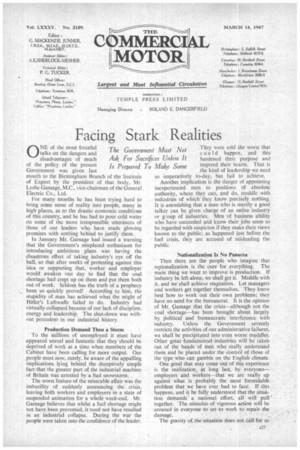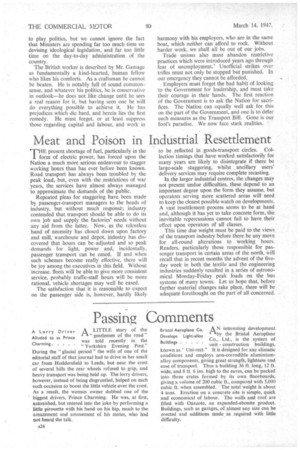O NE of the most forceful talks on the dangers and
Page 25

Page 26

If you've noticed an error in this article please click here to report it so we can fix it.
The Government Must Not disadvantages of much Ask -For Sacrifices Unless It of the policy of the present Is Prepared To Government was given last month to the Birmingham Branch of -the Institute of Export by the president of that body, Mr. Leslie Gamage, MC., vice-chairman of the General . Electric Co., Ltd.
For many months he has been trying hard to bring some sense of reality into people, many in high places, as to the drastic economic conditions of this country, and he has had to pour cold water on some of the more irresponsible utterances of those of our leaders who have made glowing promises with nothing behind to justify them. In January Mr. Gamage had issued a warning that the Government's misplaced enthusiasm for introducing ambitious plans was having the disastrous effect of taking industry's eye off the ball, so that after weeks of protesting against this idea or supporting that, worker and employer would awaken one day to find that the coal shortage had crept up on them and put them both out of work. Seldom has the truth of a prophecy been so quickly proved! According to him, the stupidity of man has achieved what, the might of Hitler's Luftwaffe failed to do. Industry had virtually, collapsed because of our lack of discipline, energy and leadership. The shut-down was without precedent in our industrial history.
Production Demand Then a Storm To the millions of unemployed it must have appeared unreal and fantastic that they should be deprived of work at a time when members of the Cabinet have been calling for more output. Our . people must now, surely, be aware of the appalling implications lying behind the deceptively simple fact that the greater part of the industrial machine of Britain was arrested by a bad snowstorm.
The worst feature of the miserable affair was the imbecility of suddenly announcing the crisis, leaving both workers and employers in a state of suspended animation for a whole week-end. Mr. Gamage believes that whilst a fuel shortage might not have been prevented, it need not have resulted in an industrial collapse. During the war the people were taken into the confidence of the leader. They were told the worst that could happen, and this hardened their purpose and Make Some inspired their hearts. That is the kind of leadership we need so imperatively to-day, but fail to achieve.
Another implication is the danger of appointing inexperienced men to positions of absolute authority, where they can, and do, meddle with industries of which they know precisely nothing. It is astonishing that a man who is merely a good talker can be given charge of an entire 'industry or g-oup of industries. Men -of business ability who have succeeded and know their jobs seem to be regarded with Suspicion if they make their views known to the public; as happened just before the fuel crisis, they are accused of misleading the public.
Nationalization Is No Panacea Then there are the people who imagine that ngtionalization is the cure for everything. The main thing we want to improve is production. If industry be left alone, we shall get it. Meddle with it, and we shall achieve stagnation. Let managers and workers get together themselves. They know best how to work out their own problems; they have no need for the bureaucrat. It is the opinion of Mr. Gamage that the crisis—although not the coal shortage—has been brought• about largely by Political and bureaucratic interference with industry. Unless the Government severely restricts the activities of our administrative failures, we shall be precipitated into -even worse muddles. Other great fundamental industries will be taken ont of the hands of men who really understand them and be placed under the control of those of the type who can gamble on the English climate.
One good that may come out of this experience is the realization, at long last, by everyone— employers and workers—that we are really up against what is probably the most formidable problem that we have ever had to face. If this happens, and it be fully understood that the situation demands' a national effort, all will pull together. The stimulus of vigorous action will be aroused in everyone to set -to work to repair the damage.
The gravity of, the situation does not call for us to play politics, but we cannot ignore the fact that Ministers are spending far too much time on devising ideological legislation, and far too little time on the day-to-day administration of the country.
The British worker is described by Mr. Gam age as fundamentally a kind-hearted, human fellow who likes his comforts. As a craftsman he cannot be beaten. He is notably full of sound commonsense, and whatever his politics, he is conservative in outlook—he does not like change until he sees a real reason for it, but having seen one he will do everything possible to achieve it. He has prejudices which die hard, and herein lies the first remedy. He must forget, or at least suppress those regarding capital and labour, and work in
Meat and Poison in
THE present shortage of fuel, particularly in the form of electric power, has forced upon the Nation a much more serious endeavour to stagger working hours than has ever before been known. Road transport has always been troubled by the peak load, but, even with the restrictions of war years, the services have almost always managed to approximate the demands of the public.
Repeated pleas for staggering have been made by passenger-transport managers to the heads of industry, but without much response; industry contended that transport should be able to do its own job and supply the factories' needs without any aid from the latter. Now, as the relentless hand of necessity has closed down upon factory and mill, warehonse and depot, industry has discovered that hours can beadjusted and so peak demands for light, power and, incidentally, passenger transport can be eased. If and when such schemes become really effective, there will be joy among the executives in this field. Without increase, fleets will be able to give more consistent service, probably traffic-staff hours will be more rational, vehicle shortages may well be eased.
The satisfaction that it is reasonable to expect on the passenger side is, however, hardly likely harmony with his employers, who are in the same boat, which neither can afford to rock. Without harder work, we shall all be out of our jobs.
Trade unions also must abandon restrictive practices which were introduced years ago through fear of unemployment." Unofficial strikes over trifles must not only be stopped but punished. In our emergency they cannot be afforded.
Employers must forget the bad habit of looking to the Government for leadership, and must take their courage in their hands. The first reaction of the Government is to ask the Nation for sacrifices. The Nation can equally well ask for this on the part of the Government, and one is to defer such measures as the Transport Bill. Gone is our fool's paradise. We now face stark realities.
Industrial Resettlement to be reflected in goods-transport circles. Collection-timings that have worked satisfactorily for many years are likely to disintegrate if there be large-scale staggering, whilst ancillary users' delivery services may require complete recasting.
In the larger industrial centres, the changes may not present undue difficulties, these depend to an important degree upon the form they assume, but operators serving more scattered areas will need to keep the closest possible watch on developments. A vast resettlement process seems to be at hand and, although it has yet to take concrete form, the inevitable repercussions cannot fail to have their effect upon operators of all classes.
This time due weight must be paid to the views of the transport industry before there be any move for all-round alterations to working hours. Readers, particularly those responsible for passenger transport in certain areas of the north, will recall that in recent months the advent of the fiveday week in both the textile and the engineering industries suddenly resulted in a series of astronomical Monday-Friday peak loads on the bus systems of many towns. Let us hope that, before further material changes take place, there will be adequate forethought on the part of all concerned.




















































































